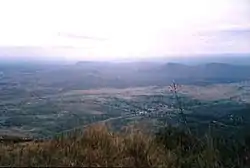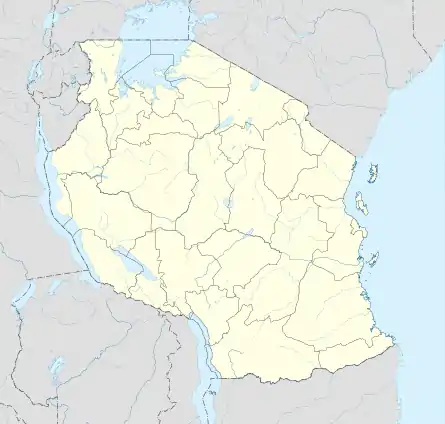Mazinde
Mazinde is a community in the Korogwe District of the Tanga Region of Tanzania.
Mazinde | |
|---|---|
 View from Irente View Point on the Usambara Mountains, looking down on the Mazinde sisal plantation | |
 Mazinde | |
| Coordinates: 4.807327°S 38.211841°E | |
| Country | Tanzania |
| Region | Tanga Region |
| District | Korogwe District |
| Elevation | 571 m (1,873 ft) |
| Population | |
| • Total | 20,534 |
| Time zone | UTC+3 (EAT) |
Location
Mazinde lies in the Maasai plains to the west of the West Usambara Mountains. The community is on the main road between Moshi and Dar es Salaam.[1] The cliffs rise almost vertically behind the village to the Irente viewpoint, 800 metres (2,600 ft) above.[2]
Pre-colonial era
Johann Jakob Erhardt recorded the repulse of a Maasai raid in 1853 at Mazinde by an allied army of Shambaa under Semboja, son of Kimweri ye Nyumbai, and of Wazigua, Parakuyo and "Arabs" (most likely Swahili).[3] One of Kimweri's junior sons, Semboja, was made chief of Mazinde, which lay on the northern caravan route between the coast and the interior.[4] He later allied himself with the Maasai.[5] Semboja followed coastal architecture in the design of the buildings at Mazinda, dressed as an Arab and ate Arab-style food.[6] However, the language at his trading post was Zigula rather than Swahili.[7]
After Kimweri died, the Shambaa kingdom split up. Semboja retained authority at Mazinde, while his son Kimweri Maguvu reigned as a puppet in Vugha. In 1885 Kimweri Maguvu signed a treaty with a German agent, but Semboja did not at first support the arrangement. After an unsuccessful attempt to persuade his rivals to unite against the Germans, in February 1890 Semboja received a German force at Mazinde and agreed to raise their flag in return for recognition of his authority.[8]
Sisal
The Mazinde estate, owned by Major William Lead in 1930, was a major sisal plantation. In face of strong global competition, he organized East African sisal producers in Tanganyika into Tanganyikan Sisal Grower's Association (TSGA) that year, and reduced wages by 50%.[9] Starting on 25 November 1958 the estate was the scene of a 68-day strike against the TSGA. The government was forced to intervene, and appointed a commission that recommended appointing representative for the plantation workers and establishing a new agreement between the union and the employers.[10] While other sisal estates were nationalized by the post-colonial government, the Mazinde estate remained privately owned by a British national until being sold to M/s Mohammed Enterprises (T) Limited a few years before 2008.[11]
References
Citations
- Briggs & McIntyre 2013, p. 272.
- Solomon 2012.
- Biginagwa 2012, p. 102.
- Illife 1979, p. 65.
- Feierman 1990, p. 88.
- Illife 1979, p. 78.
- Illife 1979, p. 79.
- Illife 1979, p. 99.
- Ingham & Simmons 1987, p. 214.
- Agyeman 2003, p. 93.
- Tenga 2008, p. 40.
Sources
- Agyeman, Opoku (2003-01-01). The Failure of Grassroots Pan-Africanism: The Case of the All-African Trade Union Federation. Lexington Books. ISBN 978-0-7391-0620-4. Retrieved 2013-09-09.CS1 maint: ref=harv (link)
- Biginagwa, Thomas John (2012). "HISTORICAL ARCHAEOLOGY OF THE 19TH - CENTURY CARAVAN TRADE IN NORTH-EASTERN TANZANIA: A ZOOARCHAEOLOGICAL PERSPECTIVE" (PDF). Retrieved 2013-09-09.CS1 maint: ref=harv (link)
- Briggs, Philip; McIntyre, Chris (2013-08-09). Tanzania Safari Guide: With Kilimanjaro, Zanzibar and the Coast. Bradt Travel Guides. ISBN 978-1-84162-462-4. Retrieved 2013-09-10.CS1 maint: ref=harv (link)
- Feierman, Steven M. (1990-11-14). Peasant Intellectuals: Anthropology and History in Tanzania. Univ of Wisconsin Press. p. 88. ISBN 978-0-299-12523-3. Retrieved 2013-09-09.CS1 maint: ref=harv (link)
- Illife, John (1979-05-10). A Modern History of Tanganyika. Cambridge University Press. ISBN 978-0-521-29611-3. Retrieved 2013-09-09.CS1 maint: ref=harv (link)
- Ingham, Barbara; Simmons, Colin (1987-09-17). Development Studies and Colonial Policy. Taylor & Francis. ISBN 978-0-203-98921-0. Retrieved 2013-09-10.CS1 maint: ref=harv (link)
- Solomon, Davina E. (11 April 2012). "The Irente Viewpoint". Retrieved 2013-09-10.CS1 maint: ref=harv (link)
- Tenga, M. G. (2008-04-01). Sisal Industry in Tanzania Since Colonial Era. Xlibris Corporation. ISBN 978-1-4628-2351-2. Retrieved 2013-09-10.CS1 maint: ref=harv (link)